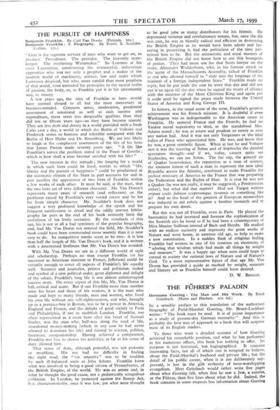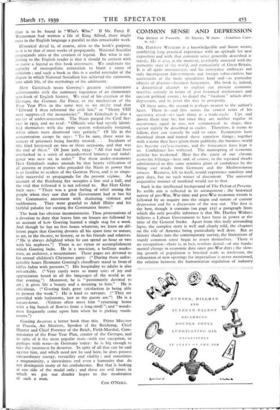THE FUHRER'S PALADIN
IN a sensible preface to this translation of the authorised biography of Field-Marshal Goering, Mr. Bruce-Lockhart writes : " The book must be read. It is of prime importance as a study of present-day German mentality." And this is probably the best way of approach to a book that will surprise most of its English readers.
To those who want a detailed account of how Goering achieved his remarkable position, and what he has performed in his numerous offices, this book has nothing to offer. Its purpose is not historical, but hagiographical. It contains interesting facts, not all of which one is tempted to believe, about the Field-Marshal's boyhood and private life ; but the detail of his public career, when it is not deliberately sup- pressed, is lost in the glib verbosity of hero-worshipping evangelism. Herr Gritzbach would rather write five pages about what Goering felt, when first he saw a Jew, a sunrise, or the Fiihrer, than five lines about what he did. Indeed, the book contains in some respects less information about Goering than is to be found in " Who's Who." If Mr. Percy F. Westerman had written a life of King Alfred, there might exist in the English language a parallel to this remarkable work.
Historical detail is, of course, alien to the book's purpose, as it is to that of most works of propaganda. National Socialist propaganda aims at the creation of legend. But what is sur- prising to the English reader is that it should be content with so naive a legend as this book constructs. We underrate the capacity of monopolistic reiteration to blunt a sense of criticism ; and such a book as this is a useful reminder of the degree in which National Socialism has achieved the extension, into adult life, of the mythology of the adolescent.
Herr Gritzbach treats Goering's greatest administrative achievements with the summary vagueness of an elementary text-book of English history. We read of his creation of the Gestapo, the German Air Force, or the mechanism of the Four Year Plan in the same way as we might read that "Edward I then reformed the civil law," 01 " Henry VIII next suppressed the monasteries." Herr Gritzbach is also a mater of under-statement. The Nazis purged the Civil Ser- vic•e in 1933, and we read : " Officials who had openly identi- fied themselves with the party system voluntarily resigned, while others were dismissed very politely." Of life in the concentration camps he says: " To be sure, there were in- stances of prisoners being harshly treated. . . Incidents of this kind happened on two or three occasions, and that was the end of them." Of June 3oth, x934 : " All that had been overlooked in a spirit of misunderstood leniency and indul- gence was now set in order." For these under-statements Herr Gritzbach makes amends by that hearty vilification of all persons or parties who preceded the Nazis in power that is so familiar to readers of the German Press, and is so singu- larly successful as propaganda for the present regime. An account of the Reichstag fire occupies a line and a half, and the trial that followed it is not referred to. But Herr Gritz- bach says: " There was a great feeling of relief among the people when they saw that the Government had at last hit the Communist movement with shattering violence and suddenness. They were grateful to Adolf Hitler and his faithful paladin for ousting the Communist brutes."
The book has obvious inconsistencies. Thus protestations of a devotion to duty that leaves him no leisure are followed by an account of how Goering hunted a single stag for a week. And though he has no free hours whatever, we learn on dif- ferent pages that Goering devotes all his spare time to nature, to art, to the theatre, to history, or to his friends and relatives. (" He is always delighted when he can spend an hour or two with his nephews.") There is no virtue or accomplishment which Goering lacks. He is a musician, a brilliant marks- man, an architect, a mountaineer. Three pages are devoted to his annual children's Christmas party. (" During those unfor- gettable hours Hermann Goering's chauffeurs stand in front of tables laden with presents.") His hospitality to adults is also remarkable. (" Very rarely were so many cries of joy and appreciation heard in all the languages of the world as on that evening.") Moreover, he is " passionately devoted to art ; it gives life a beauty and a meaning to him." He is chivalrous. (" Goering finds great satisfaction in being able to protect the weak.") He is kind to servants. (" They are provided with bathrooms, just as the guests are.") He is a nature-lover. (Visitors often meet him " returning home with a big bunch of flowers from a long stroll "; and " woods- men frequently come upon him when he is picking mush- rooms.") Goering deserves a better book than this. Prime Minister of Prussia, Air Minister, Speaker of the Reichstag, Chief Hunter and Chief Forester of the Reich, Field-Marshal, Com- missioner of the Four Year Plan, creator of the Gestapo, and in spite of it the most popular man—with one exception, or perhaps with none—in Germany today : he is big enough to take the treatment he deserves. In spite of all that can be said against him, and which need not be said here, he does possess extraordinary energy, versatility and vitality ; and sometimes a magnanimity, a shrewdness and even a humanity that do not distinguish many of his confederates. But that is looking at one side of the medal only ; and these are evil times in which we pin our slender hopes to the moderation of such a man.
CON O'NEILL.











































 Previous page
Previous page